Book 7B Unit4 Period 5
牛津 7B Unit4 Period1 练习

Period 1 Welcome to the unit一、翻译词组。
1.跟着我__________________________2. 上/下去__________________________3.害怕___________________________4. 确信____________________________5.远离___________________________6. 不得不___________________________7.到达那里________________________ 8. 认识路___________________________9.在我们学校南面10.去动物园___________________________二、根据句意及汉语提示写单词。
1._____________(跟随)me,I will show you the way.2. The mountain is ____________ (在北方)of Beijing.3. They are going on a____________ (旅行)to the zoo.4. Is Hubei ______________ (在南面)of Hunan?三、单项选择。
( ) 1. It is sunny today. Let’s_____________ out to play football together.A. goB. wentC. goesD. going( ) 2.—Could you tell me how to get to the park?—____________________.A. Yes, here you are.B. Sure. Look, it is over there.C. No, it is not far.D. Thank you. ( ) 3. You know many girls are afraid ____________ getting fat.A. ofB. toC. aboutD. that( ) 4. I live _________the market, so I have to drive to buy vegetables.A. far awayB. nearC. far fromD. next to( ) 5. Look! The boy ___________ a toy gun in his hand.A. hasB. haveC. is havingD. having( ) 6. — Where are you going _________your school trip?—We are going to South Hill.A. toB. forC. inD. by( ) 7. Lucy and Mary are good friends. __________ both like playing football.A. They areB. They bothC. All of themD. Two of them( ) 8.___________ is not easy for us to find the new shopping mall.A. ThatB. ItC. HeD. This( ) 9. Who are you waiting ________ the bus stop?A. forB. atC. f or atD. near( ) 10. The sports shoes are yours. One is here, where is ___________ one?A. anotherB. the otherC. o thersD. other( )11. Jim is talking __________football ____________ Jack now.A. about;withB. o f; withC. with ;toD. of;to( ) 12. Peter lives on the ground floor and I live _____________ him.A. two floors aboveB. two floor belowC. on two floors aboveD. on two floors below( )13. There is a bridge________ the river.A. atB. crossC. overD. under( )14.—_______your maths?—Quite well. Thank you.A. What do you doB. Why do you doC. How are you getting on withD. Are you good ( )15.一__________ do you hold a sports meeting in your school?一Once a year.A. How oftenB. How farC. H ow longD. How soon四、句型转换。
7B_Unit_4_Finding_your_wayYH

To get to the Zoo, turn left when you come to the crossroads. The entranceis on your left.When you come to the corner of the road, turn right and you’ll see a hotel.Cross the road and you’ll see the museum.Period 1 Comic strip & Welcome to the unitTeaching goals●To introduce the topic of places and transport●To activate existing vocabulary and identify the meanings of new wordsrelated to the topic●To guess meaning from pictures●To talk about visits and means of transport using model sentencesTeaching proceduresStep 1 Presenting1. (show them a picture about the birds flying to the south)T: Where do birds fly in autumn?S: They fly to the south.T: Where do they fly in spring?S: They fly back to the north.Get them ready for the words about directions.2. Show them the chart about directions.north-west, north, north-east, west, east, south-west, south, south-eastT: Can you say the directions out with correct words?S:…T: Now please read these words after me for two times.S:…3. T: Now I want you tell us something about your living community. You can tell your partners about your own community. You must use some words about directions. You can draw a picture first.(a hospital, a restaurant, a supermarket, a school, a bus stop, a hotel, a shopping mall…)S:…Step 2 Presenting1. Take one picture from the student and ask the others.T: Where is the hospital/restaurant/hotel…?S: The hospital is north/east/… of my house.2. The students can work in pairs and ask each other some questions. e.g.S1: Where is the supermarket?S2: The supermarket is …3. Ask several pairs to do the dialogue.4. T: Now I have a question. How do you usually go to school?S: I usually go to school by bike/ by bus / on foot…1.Ask students to make up new dialogues using different transport means, thenask them to role-play it.Step 3 Presention1.T: The Class 1, Grade 7 students are planning a spring outing. Read the instructions. Look at the map and find the places they plan to visit. Then write the numbers in the boxes. (The teacher read the three sentences to them and let them write down the correct numbers)2. T: How can we get to the Park Lake/ the Zoo/ the Sunnyside Garden?S: Let’s go there by bus/underground…T: We also can use other expressions to give suggestions.Why don’t we…?What about …?Why not…?T: Now please work in pairs and make up a new dialogue, and then ask them to role-play it.S:…Step 4 Practicing1. Show them a picture and ask them work in a group of four students.S1: Where is the park/…?S2: The park/… is …S1: Let’s go to the park/…S2:OK.S1:How can we go there?S2:We can go there by bus/on foot/…2. Ask some pairs to practice the dialogue.Step 5 Presenting1. Ask the students to look at the comics on page 42.T: Hobo and Eddie are going to a spring outing. Now please listen to the tape and answer the questions.Where are Hobo and Eddie standing? (On top of a hill.)How does Hobo go down the hill? (Hobo jumps down.)What does the sign say? (It says ‘Dogs this way’.)Do they have to go up the hill again? (Yes, they do.)2. T: Now please listen to the tape.3. T: Ok, let’s read the dialogue together.S:…4. T: Now, I’ll give you 2 minutes to read the dialogue with your partner. Then I’ll invite some of you to come to the blackboard and role-play it.Step 6 Doing homework1. Read the dialogue after class.2. Recite the new words and the structures today.3. Finish the exercises on the workbook.Period 2 Reading (Ⅰ)Teaching goals●To infer meaning from keywords, context and existing knowledge●To understand a series of events and simultaneous actions.●To identify specific details by following a route and marking points on a map.Teaching proceduresStep 1 RevisionReview the words about directions.Step 2 Presenting1. T: Look at me. Can you try to guess what I am doing? (push, pull.)2. T: I have some more new words, please look at these pictures and tell me what they are.(police station, police uniform, robbers, green van, traffic lights, knife, building)3.Then make up a new dialogue with these words.T: Look! There is a building. It’s a police station. In the police station, there are three robbers. They are in police uniform. There is a green van nearby. In the van there is a knife. The policemen find the robbers at the traffic lights.Why are the three robbers in police uniform in the police station? Can you guess?T: Now please look at the picture on page 46 C2 . Can you find the following places?(restaurant, hotel, Hill Building, police station, Park Road, 4th Street, 5th Street, 6th Street, 7th Street,8th Street)4. T: Ok, you know about the places, let’s do part B1 on page 45.Step 3 Reading1.T: Now please listen to the tape, and try to answer the questions.How many people are there in the story?Who are they? (the twin brothers, Susan, and the policeman.)Do the twins go to the police station? (Yes, they do.)2.T: Ok, you can open your book now and check the answers.Please read the text quickly and answer the following questions.Who is making a call to the twin brothers? (Susan.)Where are the robbers? (They are in Hill Building.)How do the twins go to Hill Building? (They drive there.)What do the robbers push the twins into? (They push them into a van.)How do the twins open the back door of the van? (They use a knife.)Who do the twins see at the police station? (They see the robbers.)Step 4 Reading1. Now please work in a group of 4 students. Try to draw out Justin’s and Paul’s route to the police station on the map. ( check the answers)2. T: Let’s look at these True or False questions, and write T if it is true, write F if it is false.The twins use a knife to open the back door of the van. (T)The twins run to the police station on 5th Street. ( F)When the van stops at Hill Building, the twins jump out of it at once. (F)Justin and Paul take different routes to the police station. (T)At the police station, the twins are happy to see the robbers. (F)The twins catch the robbers. (F)Check the students’ answers and provide help if necessary.3.Now please read after the tape for one time.4.Please work in a group of 4 students, each student read one person.(Susan, policeman, Justin, Paul) Ask the best group to show their play to the others.5.Finish the exercises of B2 on page 45 and C1 on page 46.Step 5 SummaryToday we learned about the story of a robbery, now please read the story again.Step 6 Doing homework1. Read the text familiarly and try to recite it if possible.2. Ask my students to try to tell the story in their own words.Period 3 Reading (Ⅱ)Teaching goals●To understand and use the expressions in the text●To retell the story in their own wordsTeaching proceduresStep 1 Presenting1.In the story, there are many useful words and expressions. Today, let’s learn them together.get a call接到一个电话; robber抢劫犯; drive to…开车前往……;ride to…骑车前往……;walk to …走路前往……; run to…跑步前往……;fly to …坐飞机前往……; get out of … 从……地方出来; ran out of…从……地方跑出来; jump out of …从……地方跳出来;look out of…向……外面看;at once= right now 立刻,马上;three men in police uniform 三个穿警服的人;push… into the van推进;drive away开车离开;run away跑开2.Paul try to open the door but failed.我尽力赶早班车,但没赶上.3.It works.My computer doesn’t work. There must be something wrong with it.4.He uses a knife to open the door. He opens the door with a knife.5.take different routes (to)…/ take this route (to)…6.turn left/right into (to) …Road/Street7.go/walk along … Street8.The van stops at the traffic lights. Suddenly, Justin stops talking9.We stop the van. stop doing sth.10.He is surprised to see the three men in the police station.He is very happy to see his dearest grandma again.I am very sorry to hear the bad news.11.They try to run away but we catch them in the end.in the end=at last=finallyStep 2 Consolidation exercises1. Translationl. The man ________ (穿着警察制服) is Daniel’s uncle. (in police uniform)2. Every morning my father _________ (开车带我去) school. (drives me to)3.Lucy ________(跑出) the classroom after school. (runs out of)4.Everyone ___________(吃惊地看见)see a big cat when it ________(跳出) the box.( is surprised to, jumps out of )5.Policemen often help students cross the road___________(在交通灯处). (at the traffic lights)6.Shall we ___________(走不同的线路)to the shopping mall? Let’s see who is faster. (take different routes)2. Translation1) 保罗试图打开门,但是没有成功。
Unit4Period5ProjectAssessment(学生版)
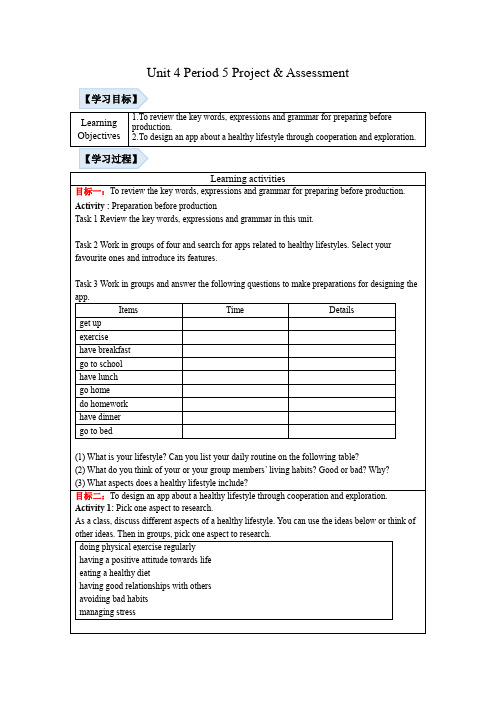
Unit 4 Period 5 Project & AssessmentLearning Objectives 1.To review the key words, expressions and grammar for preparing beforeproduction.2.To design an app about a healthy lifestyle through cooperation and exploration.Learning activities目标一:To review the key words, expressions and grammar for preparing before production. Activity : Preparation before productionTask 1 Review the key words, expressions and grammar in this unit.Task 2 Work in groups of four and search for apps related to healthy lifestyles. Select your favourite ones and introduce its features.Task 3 Work in groups and answer the following questions to make preparations for designing the app.ItemsTimeDetailsget up exercise have breakfast go to school have lunch go home do homework have dinner go to bed(1) What is your lifestyle? Can you list your daily routine on the following table?(2) What do you think of your or your group members’ living habits? Good or bad? Why? (3) What aspects does a healthy lifestyle include?目标二:To design an app about a healthy lifestyle through cooperation and exploration. Activity 1: Pick one aspect to research.As a class, discuss different aspects of a healthy lifestyle. You can use the ideas below or think of other ideas. Then in groups, pick one aspect to research. doing physical exercise regularly having a positive attitude towards life eating a healthy diethaving good relationships with others avoiding bad habits managing stress【学习目标】【学习过程】Activity 2: Research the chosen aspect.As a group, research your chosen aspect. Use the ideas below to help you.●Functions●Name of the app●Purpose●Contents●Target users●DesignActivity 3: Study more about the sample app.(1) What elements does this app design contain?(2) In your opinion, what’s the highlight of the sample? What can you learn from the sample?Activity 4: As a group, put together all the information to make part of the app design.To design an app well, you should:☆ Add related pictures and content if necessary.☆ Pay attention to the layout of the app and revise the draft to make sure there are no mistakes.Activity 5: Present the chosen aspect about a healthy lifestyle. At the end of each presentation, other groups can ask questions about it or put forward suggestions.Activity 6: Evaluate the work of this project. Then the whole classvote on which app is the best.Activity 7: Polish the apps.Summary:B If improvement is required for some of the areas above, make an action plan.。
译林牛津版七年级英语下册7B Unit4 按课时知识点梳理及拓展
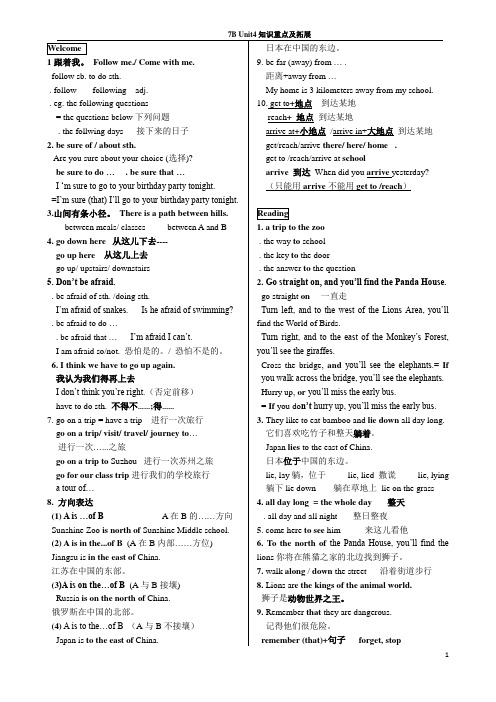
9. Remember that they are dangerous. 记得他们很危险。
remember (that)+句子 forget, stop
1
7B Unit4 知识重点及拓展
remember to do … 记得去做某事 (未做) Remember to close the window when you leave remember doing … 记得做过某事 (已经做过)
(4) A is to the…of B (A 与 B 不接壤)
Japan is to the east of China.
Cross the bridge, and you’ll see the elephants.= If
you walk across the bridge, you’ll see the elephants.
go up here 从这儿上去
1. a trip to the zoo . the way to school . the key to the door
go up/ upstairs/ downstairs
. the answer to the question
5. Don’t be afraid. . be afraid of sth. /doing sth.
Japan lies to the east of China. 日本位于中国的东边。
lie, lay 躺,位于 lie, lied 撒谎 lie, lying
躺下 lie down 躺在草地上 lie on the grass
4. all day long = the whole day 整天
. all day and all night 整日整夜
高中英语Unit4Period5WritingWorkshop北师大版选择性必修第二册

UNIT 4 Period Five基础练Ⅰ.单词拼写1.______________(幸运地),people are beginning to realise how serious the pollution is.2.You are buying direct,rather than through an __________(代理人).3.It was a dilemma because the footballer could have __________(要求) damages if we were wrong.4.If you are __________(期望) a baby,your smoking habit might cause problems for it.5.Her __________(幽默) and determination are a source of inspiration to others.【答案】1.Fortunately 2.agent 3.demanded4.expecting 5.humourⅡ.单句语法填空1.We were late when we got to the airport,but __________(fortunate) our plane was delayed.2.Convinced __________ his son's safety,the father turned off the light and went to bed.3.It was __________(astonish) that she should accept such a hard job.4.We are having trouble keeping up with the recent surge __________ demand.5.They closed the window in __________ (expect) of rain.6.I will never forget the days __________ we worked in the small town.7.As is known to all, our body is made up of countless________(cell).8.The girl came in and ________(whisper) something in the teacher's ear.9.He is believed to be one of the most talented ________(comedian).【答案】1.fortunately 2.of 3.astonishing4.in 5.expectation 6.when 7.cells8.whispered ediansⅢ.选词填空make an attempt, on the contrary, grow up, believe in, as early as 1.____________ primary school, he showed a rare talent for acting.2.No one ____________ his innocence though he tried to defend himself.3.She isn't an out-going girl.____________, she is quite shy.4.The twins ____________ on the farm and lived with their grandparents there.5.When you ____________ to change your habits, you feel more comfortable just saying you're going to do it than actually doing it.【答案】1.As early as 2.believed in 3.On the contrary 4.grew up 5.make an attemptⅣ.完成句子1.Two middle-aged passengers fell into the sea._________,________________________ could swim.两个中年游客掉进了大海。
初二英语 7b unit4&5短语复习
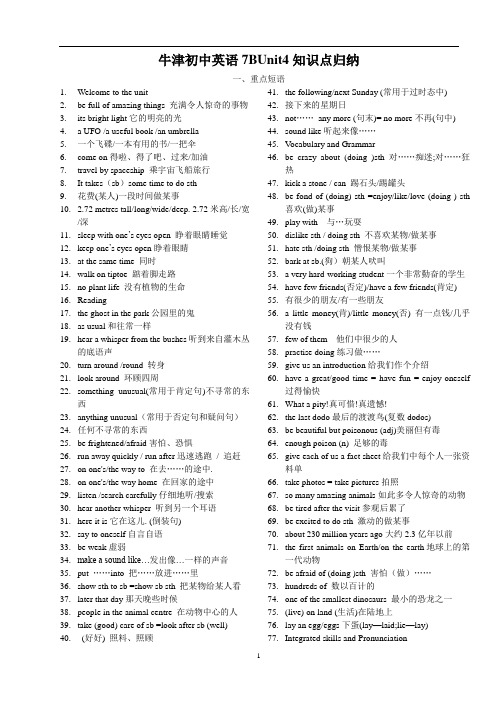
牛津初中英语7BUnit4知识点归纳一、重点短语1.Welcome to the unit2.be full of amazing things 充满令人惊奇的事物3.its bright light它的明亮的光4. a UFO /a useful book /an umbrella5.一个飞碟/一本有用的书/一把伞e on得啦、得了吧、过来/加油7.travel by spaceship 乘宇宙飞船旅行8.It takes(sb)some time to do sth9.花费(某人)一段时间做某事10. 2.72 metres tall/long/wide/deep. 2.72米高/长/宽/深11.sleep with one’s eyes open 睁着眼睛睡觉12.keep one’s eyes open睁着眼睛13.at the same time 同时14.walk on tiptoe 踮着脚走路15.no plant life 没有植物的生命16.Reading17.the ghost in the park公园里的鬼18.as usual和往常一样19.hear a whisper from the bushes听到来自灌木丛的底语声20.turn around /round 转身21.look around 环顾四周22.something unusual(常用于肯定句)不寻常的东西23.anything unusual(常用于否定句和疑问句)24.任何不寻常的东西25.be frightened/afraid害怕、恐惧26.run away quickly / run after迅速逃跑/ 追赶27.on one's/the way to 在去……的途中.28.on one's/the way home 在回家的途中29.listen /search carefully仔细地听/搜索30.hear another whisper 听到另一个耳语31.here it is它在这儿. (倒装句)32.say to oneself自言自语33.be weak虚弱34.make a sound like…发出像…一样的声音35.put ……into 把……放进……里36.show sth to sb =show sb sth 把某物给某人看ter that day那天晚些时候38.people in the animal centre 在动物中心的人39.take (good) care of sb =look after sb (well)40.(好好) 照料、照顾41.the following/next Sunday (常用于过时态中)42.接下来的星期日43.not……any more (句末)= no more不再(句中)44.sound like听起来像……45.Vocabulary and Grammar46.be crazy about (doing )sth 对……痴迷;对……狂热47.kick a stone / can 踢石头/踢罐头48.be fond of (doing) sth =enjoy/like/love (doing ) sth喜欢(做)某事49.play with 与…玩耍50.dislike sth / doing sth 不喜欢某物/做某事51.hate sth /doing sth 憎恨某物/做某事52.bark at sb.(狗)朝某人吠叫53. a very hard-working student一个非常勤奋的学生54.have few friends(否定)/have a few friends(肯定)55.有很少的朋友/有一些朋友56. a little money(肯)/little money(否) 有一点钱/几乎没有钱57.few of them 他们中很少的人58.practise doing练习做……59.give us an introduction给我们作个介绍60.have a great/good time = have fun = enjoy oneself过得愉快61.What a pity!真可惜!真遗憾!62.the last dodo最后的渡渡鸟(复数dodos)63.be beautiful but poisonous (adj)美丽但有毒64.enough poison (n) 足够的毒65.give each of us a fact sheet给我们中每个人一张资料单66.take photos = take pictures拍照67.so many amazing animals如此多令人惊奇的动物68.be tired after the visit参观后累了69.be excited to do sth 激动的做某事70.about 230 million years ago大约2.3亿年以前71.the first animals on Earth/on the earth地球上的第一代动物72.be afraid of (doing )sth 害怕(做)……73.hundreds of 数以百计的74.one of the smallest dinosaurs 最小的恐龙之一75.(live) on land (生活)在陆地上y an egg/eggs下蛋(lay—laid;lie—lay)77.Integrated skills and Pronunciation78.live up to活到……(up to 多达,达到)79.each of their eyes 它们的每只眼睛80.smell things as well as 和…一样嗅觉好81. a thank-you letter一封感谢信82.remember your words about tortoises83.记住你关于乌龟的描述84.It is interesting to do 做某事很有趣85.tell sb(not)to do sth 告诉某人做(不做)某事86.after a meal = after meals饭后87.it says = people/they say 据说88.weigh 100 grams at birth /weigh yourself89.在出生时称100克/称自己的重量(v)90.the weight of 6 elephants 六头大象的重量(n)91.sth happen to sb 某人发生某事92.during /in one's life/during our lives93.在某人的一生中/在我们的一生中94.decide to do sth 决定做某事95.Main task and Checkout96.love playing cards喜欢玩纸牌97.stop to have dinner 停下来吃饭……after……(v) 以……命名 his son Tom 给他的儿子取名为汤姆 station 电视台101.the tallest man in history 历史上最高的人102.at the age of 21 = at 21 = when sb was 21 . 在21岁时103.few of them他们中很少的人104.know the history of……知道……的历史105.eat……as dinner吃……作为晚饭(ate)106.keep on doing 继续做……107.(be )set up (被)建立;(被)建造108.dresses made of silk = silk dresses 丝绸做成的连衣裙109.thousands of years ago 数千年前110.learn a lot/much about Chinese history学到许多中国的历史111.be surprised to do sth吃惊的做某事112.be surprised at/about sth对……感到吃惊113.have over/more than dreams 做1000多个梦114.at least 至少115.by 1966 到1966年二、重点句子116.1.It takes about three days to travel from Earth to the moon by spaceship.117.乘宇宙飞船从地球到月球旅行大约花费三天时间118.2.Fish sleep with their eyes open 鱼是睁着眼睛睡觉的(with 表示一种伴随状态)119.3.You cannot sneeze and keep your eyes open at the same time. 你做不到在打喷嚏的同时睁着眼睛。
人教版七年级下册英语Unit 4 Period 5 Section B(3a-Self Check)

Ihavetogetupat...Ican’t...Ihaveto...; 3.发表自己的看法:Therulesare...but... Imust...
添彩点:①用therebe句型表明在“我”家里有很多的规则。 ②用haveto表明在规则的制约下自己“不得不”去做的事。 ③用转折连词but表明作者对家规的看法——虽然有些苛刻,
IruntoschoolbecauseI__________3belate. can’t
Atschool, wehave_____m__o_re__4rules—don’tbe______n_o_i_s_y5,
don’teatinclass,...
MydadsaysIcan’tplaybasketballafterschoolbecauseI__________6d omyhomework. Icanpmlauysotnlyonweekends. Afterdinner,
DearDr. Know,
______youhelpme? Can
I'mnothappybecausetherearetoomanyrulesathome.
Everymorning,
I______ghetauvpeatotsixo'clock.
Atschool,
I______h_a_vweteoaraschooluniform,
e.g. Wemustkeeptheclassroomclean. 我们必须保持教室干净。 Keepthechildrenawayfromthefire, please. 请让孩子们远离火。
keep的其他用法 “保存”,及物动词。 “遵守”,及物动词,与follow同义。 “保持”,可作及物动词,也可作不及物动词, 后可接形容词作表语。
Unit4Period5WritingPresentingideas(学生版)
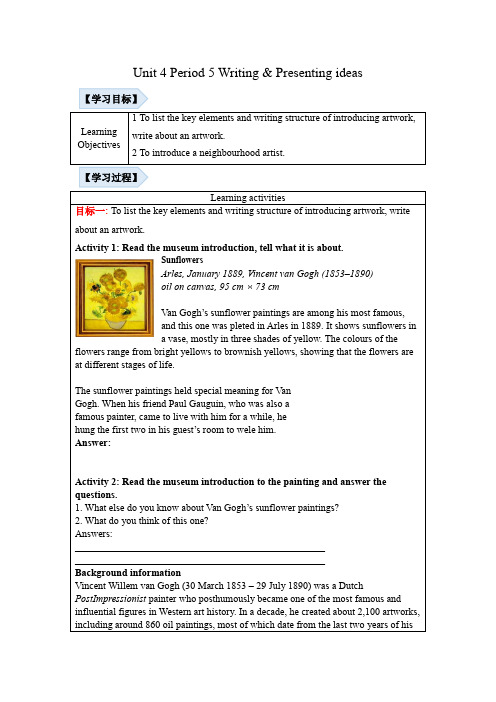
Unit 4 Period 5 Writing & Presenting ideas Learning Objectives 1 To list the key elements and writing structure of introducing artwork, write about an artwork. 2 To introduce a neighbourhood artist.Learning activities目标一: To list the key elements and writing structure of introducing artwork, write about an artwork.Activity 1: Read the museum introduction, tell what it is about.SunflowersArles, January 1889, Vincent van Gogh (1853–1890)oil on canvas, 95 cm × 73 cmVan Gogh’s sunflower paintings are among his most famous,and this one was pleted in Arles in 1889. It shows sunflowers ina vase, mostly in three shades of yellow. The colours of theflowers range from bright yellows to brownish yellows, showing that the flowers are at different stages of life.The sunflower paintings held special meaning for VanGogh. When his friend Paul Gauguin, who was also afamous painter, came to live with him for a while, hehung the first two in his guest’s room to wele him.Answer:Activity 2: Read the museum introduction to the painting and answer the questions.1. What else do you know about Van Gogh’s sunflower paintings?2. What do you think of this one?Answers:____________________________________________________________________________________________________Background informationVincent Willem van Gogh (30 March 1853 – 29 July 1890) was a DutchPostImpressionist painter who posthumously became one of the most famous and influential figures in Western art history. In a decade, he created about 2,100 artworks, including around 860 oil paintings, most of which date from the last two years of his【学习目标】 【学习过程】NameSpecialityRepresentativeworksKey featuresReasons forremendationSample:____________________________________________________________________________________________________Activity 2: Work in groups. Talk about your remended artist and vote for the most interesting. Use the information in Activity 1 and the expressions in the box to help you.Useful expressions• I remend… because…• I think… is the best choice, because…• He / She specialises in…• His / Her work shows…• I agree with him / her.• I’m afraid that I have to disagree. I think…Activity 3: Present your chosen artist to the class. Vote for the best “Neighbourhood Artist”.Sample:______________________________________________________________________________________________________________________________________________________Summary:。
牛津英语7B_Unit4__Finding_your_way_Grammar_(2)

a monkey . It is ________
The monkey is eating an apple
It is __________ an elephant . The __________ elephant is walking .
an apple . It is ________ The apple is red.
the 1.We live on ___third floor of the tall 序数词前 building. 用于姓氏复数形式前,表示某一家人 The 2.____Whites are preparing fo 乐器前 3.My cousin ,Amy,likes playingthe ____violin. 世界上独一无二的事物 the 4.___earth goes around ____sun. The 形容词最高级前 the 5.I believe you are ____best singer . The 6.____rich should try their best to help the ____poor. 某些形容词前,表示某一类人
Notes: 1 lie on the grass 躺在草地上 lie on 躺在…上 lying是lie的现在分词形式 2 look like 看起来像… 3 in an open area 在一片开放的区域 4 in a very big cage在一个很大的笼子里 5 What can you see across it? 你能看到桥对面有什么? 6 go across the bridge 走过桥
The Smiths are having supper at home 13. ______ now.
高二英语Book 7 Unit 4课件(知识点语法)

Unit 4 sharing
Give roses to others and the lasting fragrance will remain in your hand.
Unit4 Warming-up & Reading
Warming-up
Have you ever helped your parents, or other relatives, or your friends? No
If so, Would you be called a “ volunteer ” this time?
People who help others in their community or outside their community would be called volunteers. In other words, one who offers his or her services to those who are less fortunate than himself or herself is called volunteer.
2. 表示原因 With his key lost, he couldn”t get into the office. 由于钥匙丢了,他进不了办公室。
3. 表示时间 The children began to watch TV with the homework done. 孩子们完成作业以后开始看电视。 4. 表示条件 I’d like to see the new film with time permitting. 如果时间许可,我想看那部新电影。 5. 表示结果 The battle ended with the enemy defeated. 战斗结束了,敌人被打败了。
book7unit5知识点

increase (increase) 5)Nowadays,with the ________ in crime,people are much more concerned _________(concern) about their security. difference (different) to 6)Money makes no ________ him. economical (economy) to 7)This car is ___________ run because it doesn’t use much fuel.
3. preparation n. 准备 prepare v. 使有准备 e.g. He didn’t do any preparation for this exam, so he failed.他考试前没做任何准备, 所以不及格。 • (be)prepared for sth. / to do sth. 为某事做好准 备 • make preparations for sth. / to do sth. 为某 事做准备 • be in preparation 在准备中 • prepare to do sth. 准备去做某事 • 1).He packed his bag ________ ___________ _____ the journey. • 2).Mother is __________ us a meal. We may wash our hands and _________ ________the meal.
Book7 Unit 5
Travelling abroad
• Book 7 Unit 5 • G1 输出词汇 1. 祖国 2. vi 排队;n 队列 3. 自助食堂 4. 演讲 n/v 5. n资格;资历/ adj 有资格的 6. n 准备 7. vt 推荐;建议 8. n/v 舒适;安慰 9. n/v 代替品;用…代替… 10. n 需要;要求 11. 文章;散文 12. n/v 草稿;草拟 13. vt 承认; 答谢 14. 反驳vt 15. vt 占领;占据 16. n 道 歉/ v 道歉 17. n/adj 常规;日常事务;例行 的;通常的 18. 代理人;经纪人 19. adj 丰 富的;充裕的 20. v统治;管理 21. 目的地
人教版高中英语选修七(Book 7 Unit 4)考点训练

人教版高中英语选修七(Book 7 Unit 4)Unit 4 Sharing 是一个面向全球的图书分享网站。
该网站组织的分享活动有两种参与方式:一是自由分享(wild release),即把书放在指定地点,由其他参与者自由获取;二是定向分享(controlled release),即直接传递给另一位参与者。
假设你是李华,请用英文写信申请参加。
内容应包括:●表明写信目的●选择一种分享方式●简述做出该选择的理由●希望了解更多信息Dear Sir/Madam,I'm a senior high school student from China.Learning that you are organizing this activity to share books worldwide, I am writing to apply for it for the simple reason that I love reading and I own a large number of books.You've introduced two ways to share books: wild release and controlled release. Of the two, the latter wins my favour. By the means of controlled release, I only need to deliver books to other participants. Not only are books shared but it can build up a bridge connecting readers from different parts of the world as well.If you could provide more specific information, I would be well grateful. Looking forward to your reply.Yours,Li Hua1.文章体裁:应用文——书信。
新版新目标英语九年级Unit4 Period 5课件

4a write sentences about the past using used to.
1.Grace \watch a lot of TV\ watch a lot of movies
Grace used to watch a lot of TV.
She didn’t use to watch a lot of movies.
4. 你过去是长头发。 她过去是卷发。 You ______ ______ _____ long hair. She _____ ____ _____ curly hair.
5. 她过去很害羞,不敢在众人面前讲话。 She used to_____ _____and_____afraid of_____ in front of a group. 6. 汤姆变了很多,我几乎认不出他了。 Tom has changed_______ _______; I can________ recognize him.
I used to …
But now I …
keep toys in order
scatter toys all over the ground
I used to …
But now I …
sleep in class
listen to the teacher carefully
I used to …
4. Sandy \teach British English\teach American English
Sandy used to teach British English, she didn’t use to teach American English.
牛津译林版英语7BUnit4课程教案(8课时)

,.7B Unit4教课设计备课组初一英语主备人组员主备时间月日课题Unit4 Comic strip and Welcome to the unit课型新授讲课月课时第1课时日期日教课目的教课重难点课前准备1.能认识有关地址和交通的图标。
2.能讨论出游和交通方式的话题。
3.能鉴别方向。
1.能认识有关地址和交通的图标。
2.能讨论出游和交通方式的话题录音机多媒体教师活动内容、方式学生活动内容、旁注方式Check pre-exerciseStep 1. Lead-in Students watch 1.Teacher ask:In winter, where will the birds fly?the picturesIn spring, where will the birds fly back?and share the 2.Show the eight directions .answerstogether.,.Learn todescribe thedirections inour daily life.Step 2. PracticeShow pictures for students to talk about where theplaces are.Show the map of China to Describe where theprovinces are.Step3. PresentationThe teacher says: The students will have a trip.1. Find the places they plan to visit after listening.Listen and fill in2. Talk about the transport to school. Ask student’ s tothe boxes inmake dialogue like this:Part A.S1: Is your home far from our school?S2: No. It’ s north of the school, about ten milesaway.S1: How do you come to school?Talk about in S2: I come to school by⋯pairs.Step 4. Practice1.Listen to Part B and answer these questions.Where are they going for the trip?Where ’s the zoo?How will they get there?2.Practice the dialogue and then make a similar dialogue with the partner.S1: Where ’ s Sunshine Park?S2: It ’s north-east of our school.S3: Let ’ s go there.S2: OK.S1: How can we get there?S2: We can get there by bus/on foot. Step 5 Comic stripShow the cartoons for students. Ask:1.Where are Hobo and Eddie?2.Can Eddie go down the hill?3.What does the sign say?Let Ss practice the dialogue and act it out. Step 6. Discussion Take an active part in the class activity and practice speaking English.Watch the cartoons carefully andGroup work: Make a dialogue about how to get toanswer the your home.questions. ReadStep 7. Consolidation the dialoguedo some exercises and check the answers.and try to act itStep 8. Homework out in pairs.1.Read the dialogues.plete the exercises in your workbook.Discuss in3.Preview reading.groups.Finish the Ex. intime教后记Unit4教课设计备课组初一英语主备人组员主备时间月日课题Unit4Reading 1课型新授讲课月日课时第2课时日期,.教课目的教课重难点课前准备1.能依据地路,掌握方向的基本表达方法。
BOOK 4 unit 5 单词讲解
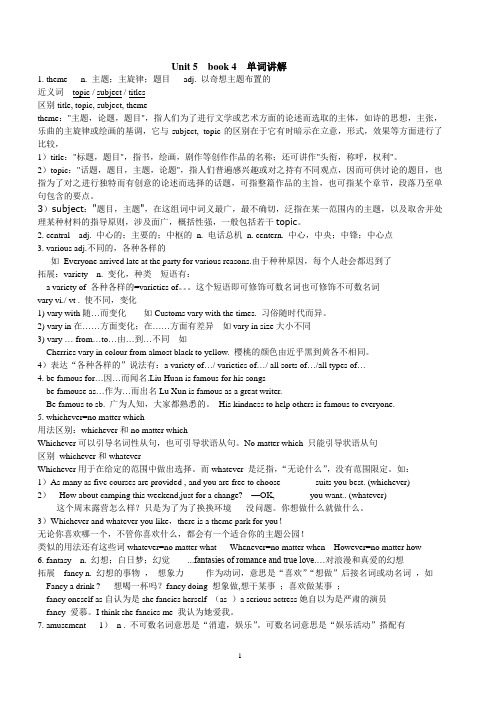
Unit 5 book 4 单词讲解1. theme n. 主题;主旋律;题目adj. 以奇想主题布置的近义词topic / subject / titles区别title, topic, subject, themetheme:"主题,论题,题目",指人们为了进行文学或艺术方面的论述而选取的主体,如诗的思想,主张,乐曲的主旋律或绘画的基调,它与subject, topic的区别在于它有时暗示在立意,形式,效果等方面进行了比较,1)title:"标题,题目",指书,绘画,剧作等创作作品的名称;还可讲作"头衔,称呼,权利"。
2)topic:"话题,题目,主题,论题",指人们普遍感兴趣或对之持有不同观点,因而可供讨论的题目,也指为了对之进行独特而有创意的论述而选择的话题,可指整篇作品的主旨,也可指某个章节,段落乃至单句包含的要点。
3)subject:"题目,主题",在这组词中词义最广,最不确切,泛指在某一范围内的主题,以及取舍并处理某种材料的指导原则,涉及面广,概括性强,一般包括若干topic。
2. central adj. 中心的;主要的;中枢的n. 电话总机n. centern. 中心,中央;中锋;中心点3. various adj.不同的,各种各样的如Everyone arrived late at the party for various reasons.由于种种原因,每个人赴会都迟到了拓展:variety n. 变化,种类短语有:a variety of 各种各样的=varieties of。
这个短语即可修饰可数名词也可修饰不可数名词vary vi./ vt . 使不同,变化1) vary with随…而变化如Customs vary with the times. 习俗随时代而异。
2) vary in在……方面变化;在……方面有差异如vary in size大小不同3) vary … from…to…由…到…不同如Cherries vary in colour from almost black to yellow. 樱桃的颜色由近乎黑到黄各不相同。
七年级英语牛津版7BUnit4教案合集1篇
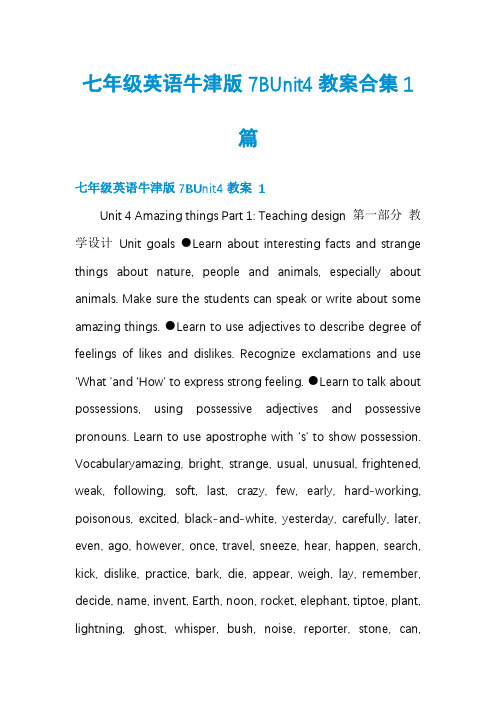
七年级英语牛津版7BUnit4教案合集1篇七年级英语牛津版7BUnit4教案 1Unit 4 Amazing things Part 1: Teaching design 第一部分教学设计Unit goals ●Learn about interesting facts and strange things about nature, people and animals, especially about animals. Make sure the students can speak or write about some amazing things. ●Learn to use adjectives to describe degree of feelings of likes and dislikes. Recognize exclamations and use ‘What ’and ‘How’ to express strong feeling. ●Learn to talk about possessions, using possessive adjectives and possessive pronouns. Learn to use apostrop he with ‘s’ to show possession. Vocabularyamazing, bright, strange, usual, unusual, frightened, weak, following, soft, last, crazy, few, early, hard-working, poisonous, excited, black-and-white, yesterday, carefully, later, even, ago, however, once, travel, sneeze, hear, happen, search, kick, dislike, practice, bark, die, appear, weigh, lay, remember, decide, name, invent, Earth, noon, rocket, elephant, tiptoe, plant, lightning, ghost, whisper, bush, noise, reporter, stone, can,cartoon, guide, introduction, pity, dodo, frog, dinosaur, scientist, kilogram, grass, baby, ant, camel, giraffe, tortoise, bone, neck, eyelid, word, goldfish, second, weight, sandwich, piece, scarf, cigarette, star, history, dish, without, during, over, anybody, nobody, everything, himself, UFO Expressions1. Come on, Eiddie. It’s just a plane. 2. Look at its brigh light. 3. A man in the USA was 2.72 meters tall. 4. You can’t sneeze and keep your eyes open at the same time. 5. Elephants walk on tiptoe. 6. As usual, they sat under the tree. 7. Suddenly, they heard a whisper from the bushes behind the tree. 8. They turned around but could not see anything unusual. 9. People in the center would take care of it. 10. Sion is crazy about football. 11. Sandy is fond of music. 12. He barks at anyone who wake him up. Structures1. It takes about three days to travel from Earth to the moon by rocket. 2. Fish sleep with their eyes open. 3. There’s no plant life without lightning. 4. Isn’t that interesting? Yes, it is. 5. He was now sure the sound came from the bushes. 6. There were so many amazing things in the museum. 7. The last ones died more than 60 million years ago. 8. my father found it interesting too. 9. It’s also interesting to know that each eye of a camel has three. 10. Let me go with you then. Period 1 Comic Strip + e to the unit Teachinggoals ●To introduce students to unusual phenomena and events ●To use adjectives to describe feelings and opinions Teaching procedures Step 1 Presentation Listen again. Try to answer the following quest ions: 1. Where’s Eddie? What does he see? 2. What does Eddie think of the strange thing? What’s hobo’s idea? 3. Why does Eddie think it’s a UFO? 4. Why does Eddie think it’s not a plane? Step 6 Practicing 1. Read the dialogue 2. Act it out. Step 7 Summary Today we have learned some amazing things. Try to find more amazing things around you. Then tell the other students. Step 8 Consolidation exercises Translation 1. 乘火车从南京到上海旅行大约需花四个小时左右。
牛津译林7B Unit 5知识点梳理

牛津译林7B Unit 5知识点梳理Welcome1.Amazing things. 令人惊奇的东西。
amaz ing / amaz ed an amaz ing thing feel amaz edexcit ing / excit ed interest ing / interest ed-ed 结尾的形容词一般指“人”;-ing 结尾的形容词一般指“物”。
be amazed at ….对……好奇We are amazed at the amazing things.我们对奇妙的东西好奇。
be amazed to do sth2. a UFO a usual book 一本平常的书 /an umbrella an unusual book 一本不寻常的书e on 加油,得了吧4. one 代词----- one s (pl.)5. look at its bright lights light blue a light bag moonlight6. fun/ interesting facts in fact have funfun ---- funny tell funny jokes .7. fish 鱼(单复同形). eg. My father caught a fish in the river yesterday.我的爸爸昨天在河里抓了一条鱼。
. Fish sleep with their eyes open. 鱼睁着眼睛睡觉。
fish 鱼肉(不可数)8.with + n. + adj..with their eyes open / closed眼睛睁着 / 眼睛闭着I like to sleep with the window closed. 我喜欢关着窗户睡觉。
9. Our eyes are the same size from birth, but our nose and ears never stop growing.我们的眼睛从出生时就是相同的大小,但是鼻子和耳朵从不会停止生长。
- 1、下载文档前请自行甄别文档内容的完整性,平台不提供额外的编辑、内容补充、找答案等附加服务。
- 2、"仅部分预览"的文档,不可在线预览部分如存在完整性等问题,可反馈申请退款(可完整预览的文档不适用该条件!)。
- 3、如文档侵犯您的权益,请联系客服反馈,我们会尽快为您处理(人工客服工作时间:9:00-18:30)。
-19-
noisy My grandpa always tells me I can’tbe _________.
I ________ listen to him because I don’t want the cat to
is strict with me, get me! My grandpa _______
-22-
4. speak English/English class We must/ have to speak English in _______________________________________ English class. _______________________________________ 5. eat/dining hall Eat in the dining hall. We have to/ must eat _______________________________________ in the dining hall. _______________________________________
because I _____________ have to/ must learn to play the
piano. I never have fun. What ____________ I can
do?
Zhao Pei
-10-
1. Is Zhao Pei happy? Why or why not? No, she isn’t. Because she has many rules in her family. 2. When does she have to get up every morning? She has to get up at six o’clock. 3. Can she play with her friends after school? Why? No, she can’t. Because she has to do her homework.
-11-
4. Can she watch TV on school nights?
No, she can’t. 5. What does she have to do on weekends? She has to learn to play the piano. 6. Does she have any fun? No, she doesn’t.
-4-
FAMILY RULES
Do your homework after school.
-5-
FAMILY RULES
Practice the guitar every day.
FAMILY RULES
-6-
Don’t watch TV after school.
-7-ly are right? Why or why not?
-8-
3a Complete Zhao Pei’s letter to Dr. Know using have to/must, can or can’t.
Dear Dr. Know, ______ Can you help me? I’m not happy because there are too many rules at home. Every morning, I have ___________ to/ must get up at six o’clock. At school, I ___________ have to/ must wear a school uniform, and I _____________ have to/ must keep my hair short.
-24-
1. _______ fight with others.
A. Not
B. No to C. Don’t
D. Doesn’t
2.---_____we eat in the dining hall? ---Yes, we_____
A. Do; does B. Can; do C. Do; can D. Can; can
-23-
课堂练习
用适当的介词填空。
1. Mike was late _______ for school yesterday because he got up late. on school 2. Zhao Pei can’t go out _______ nights. in 3. The boy _______ a blue T-shirt is my brother. 4. The students in our school can’t wear hats in _______ class. 5. —Who do you often play basketball with ________? —My friends.
-9-
After school, I ________ can’t play with my friends or watch TV because I _____________ do my have to/ must homework. I ______relax on weekends either, can’t
-17-
Fill in the blanks with the words in the box.
arrive late listen to be noisy follow the rules be strict
-18-
My name is Timmy the Mouse. I must get up early a 6:30 a.m. . Then I have to go to the kitchen to get food for Grandpa. I never arrive late to the kitchen because I have to ____________ get there before the cat gets up.
Unit 4 Don't eat in class. Section B 3a-Self Check
-2-
Let’s review the rules in your family!
Don’t be noisy.
-3-
FAMILY RULES
Don’t leave the dirty dishes in the kitchen.
3. You can’t eat _____ outside.
A. at
B. \
C. in
D. on
4.Listen to music in the hallways.(改为否定句) Don’t ______listen to music in the hallways. 5.Don’t arrive late for class.(改为同义句) be late Don’t ______ _______ for class.
-25-
1.抄写本课重点功能句两遍,并运用功能句 描述需要英文标识和规则的场所,如图书 馆、操场等。(提示:书写工整,老师评 出书写明星。) 2.制作英文规则,以海报的形式进行展览, 并应用于校园。(提示:句子首字母大写 要注意。)
-26-
Things I have to do Things I can’t do
-15-
3c Write a letter to Dr. Know. Tell him about all the rules and how you feel about them.
-16-
Dear Dr. know, There are too many rules in my life! At home, I have to help my mom and dad do the dishes every day. And I have to clean my room on Saturdays. I can’t go out with my friends on weekends. At school, we can’t eat in class. We have to wear a school uniform. And we can’t be noisy in the hallways. How can I relax with so many rules? What should I do? Ken Li
-12-
Can you list the rules of Zhao Pei’s family and school?
1. Get up at 6 o’clock.
2. Wear a school uniform and keep her hair
short. 3. Can’t play with friends after school.
but I think it’s best tofollow ______________! the rules
-20-
2 Use can, can’t, have to/must and don’t to write about the rules at school.
’t arrive late for class. 1. arrive late/class Don _________________________ We can’t arrive late for _________________________ class. to the teacher. We must/ 2. listen/teacher Listen ___________________________ have to listen to the teacher. ___________________________
